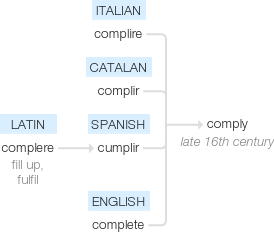Comply
late 16th century: from Italian complire, Catalan complir, Spanish cumplir, from Latin complere ‘fill up, fulfil’ (see complete). The original sense was ‘fulfil, accomplish’, later ‘fulfil the requirements of courtesy’, hence ‘to be agreeable, to oblige or obey’. Compare with compliment.
wiktionary
From Italian complire, Catalan complir(“to complete, fulfil; to carry out”), Spanish cumplir(“to complete, fulfil”), from Latin complēre, [1] from compleō(“to finish, complete; to fulfil”), from com-(prefix indicating completeness of an act) (ultimately from Proto-Indo-European *ḱóm(“beside, near; by, with”)) + pleō(“to fill; to fulfil”) (ultimately from Proto-Indo-European *pleh₁-(“to fill”)). More likely from Old French compli, past participle of complir "to accomplish, fulfill, carry out," from Vulgar Latin *complire, from Latin complere "to fill up," transferred to "fulfill, finish (a task)," from com-, here probably as an intensive prefix (see com-), + plere "to fill" (from PIE root *pele- (1) "to fill")https://www.etymonline.com/word/comply. The word is very close to the French verb "complaire" which means to satisfy or to please. The word is also cognate with Old French complir(“to accomplish, complete; to do”) (modern French accomplir(“to accomplish, achieve”)). Compare complete, compliment.
etymonline
comply (v.)
early 14c., "to carry out, fulfill" (transitive), probably from Old French compli, past participle of complir "to accomplish, fulfill, carry out," from Vulgar Latin *complire, from Latin complere "to fill up," transferred to "fulfill, finish (a task)," from com-, here probably as an intensive prefix (see com-), + plere "to fill" (from PIE root *pele- (1) "to fill").
Intransitive sense of "to consent, act in accordance with another's will or desire" is attested from c. 1600 and might have been influenced by ply (v.2), or perhaps it is a reintroduction from Italian, where complire had come to mean "satisfy by 'filling up' the forms of courtesy" (compare compliment (n.)).
